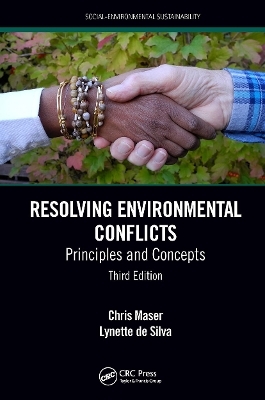
Resolving Environmental Conflicts
CRC Press (Verlag)
978-1-032-47556-1 (ISBN)
Resolving a conflict is based on the art of helping people, with disparate points of view, find enough common ground to ease their fears, sheath their weapons, and listen to one another for their common good, which ultimately translates into social-environmental sustainability for all generations. Written in a clear, concise style, Resolving Environmental Conflicts: Principles and Concepts, Third Edition is a valuable, solution-oriented contribution that explains environmental conflict management.
This book provides an overview of environmental conflicts, collaborative skills, and universal principles to assist in re-thinking and acting toward the common good, integrates a variety of new real-world conflicts as a foundation for building trust, skills, consensus, and capacity, and explains pathways to collectively construct a relationship-centric future, fostering healthier interactions with one another and the planet.
The new edition illustrates how to successfully mediate actual environmental disputes and how to teach conflict resolution at any level for a wide variety of social-environmental situations. It adds a new chapter on water conflicts and resolutions, providing avenues to healthy, sustainable, and effective outcomes and provides new examples of conflicts caused by climate change with discussion questions for clear understanding.
Land-use planners, urban planners, field biologists, and leaders and participants in collaborative environmental projects and initiatives will find this book to be an invaluable resource. University students in related courses will also benefit, as will anyone interested in achieving greater social-environmental sustainability and a more responsible use of our common natural resources for themselves and their children.
Chris Maser spent over 25 years as a research scientist in natural history and ecology in forest, desert, coastal, and agricultural settings. He has lived, worked, consulted, resolved environmental conflicts, and/or lectured in US and in Austria, Canada, Chile, Egypt, France, Germany, Japan, Malaysia, Mexico, Nepal, Slovakia, Switzerland. Today he is an independent author as well as an international lecturer, facilitator in resolving environmental conflicts, vision statements, and sustainable community development. He is also an international consultant in forest ecology and sustainable forestry practices. He has written over 290 publications, including 40 books authored and coauthored in the last 20 years. Lynette de Silva directs the Program in Water Conflict Management and Transformation at Oregon State University. She teaches courses in water conflict management; and water resources management; and has acted as a consultant to UNESCO, offering training to senior water professionals. Over the past 20 years, she has worked in areas emphasizing water resources and land management practices.
Introduction. Mediating Environmental Conflicts. Approaches to Mediation. Conflict is a Choice. Biophysical Principles of Sustainability. Social Principles of Sustainability. The Human Equation. Communication, the Interpersonal Element. The Process is the Decision. Conflict is a Learning Partnership. Teaching Mediation of Environmental Conflicts. The Four Stages of Water Conflict Management and Transformation. Water Equity. The Legacy of Resolving Environmental Conflicts. Practicing Mediation of Conscience. Resolution: Destructive Conflict Transformed into a Shared Vision. Modifying our Belief Systems Regarding Change.
| Erscheinungsdatum | 11.01.2023 |
|---|---|
| Reihe/Serie | Social Environmental Sustainability |
| Zusatzinfo | 14 Illustrations, black and white |
| Verlagsort | London |
| Sprache | englisch |
| Maße | 156 x 234 mm |
| Gewicht | 381 g |
| Themenwelt | Naturwissenschaften ► Biologie ► Ökologie / Naturschutz |
| Recht / Steuern ► EU / Internationales Recht | |
| Recht / Steuern ► Öffentliches Recht ► Umweltrecht | |
| Recht / Steuern ► Privatrecht / Bürgerliches Recht ► Zivilverfahrensrecht | |
| ISBN-10 | 1-032-47556-0 / 1032475560 |
| ISBN-13 | 978-1-032-47556-1 / 9781032475561 |
| Zustand | Neuware |
| Informationen gemäß Produktsicherheitsverordnung (GPSR) | |
| Haben Sie eine Frage zum Produkt? |
aus dem Bereich


